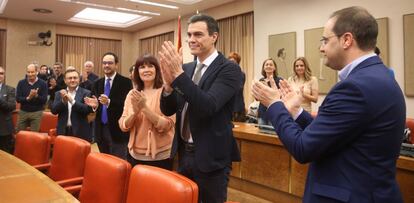Socialist chief won’t negotiate with PP or separatists, but will meet with them
“This is off to a good start,” says Pedro Sánchez after first talks in bid to form government

Socialist leader Pedro Sánchez began a round of talks on Wednesday with parties that he hopes will support his bid to become Spain’s next prime minister.
Although the PSOE chief has expressed a willingness to reach out “to the left and to the right” in order to build the largest possible alliance, he will not be seeking support from his main rival, the conservative Popular Party (PP).
“To negotiate with the PP would be to forgive it,” said Socialist organization secretary César Luena, alluding to the raft of corruption cases affecting the conservatives.
Nor will Sánchez turn to groups that support regional independence, such as Democràcia i Llibertad and ERC in Catalonia, or Bildu in the Basque Country. High-ranking Socialist officials had expressed misgivings at the concessions that might have to be made in exchange for their allegiance.
He will, however, try to meet them all to explain why their support will not be necessary.
Extra time
Following the official nomination from the king to try to form a goverment on Tuesday, Sánchez asked the speaker of Congress for an extra month to build enough political support to ensure he gets voted in. The PP and Podemos on Wednesday unsuccessfully tried to cut this period down to two weeks, but the decision is up to the speaker, the Socialist Patxi López, who said he will award Sánchez three to four weeks.
The PP, which won the December 20 election with 123 seats but lost its congressional majority and has been unable to muster enough support to get Mariano Rajoy reinstated, is hoping that Sánchez will fail in his bid to create an alternative governing alliance. This, they feel, would force the Socialists into a grand coalition with the PP.
Meanwhile, the anti-austerity Podemos is hoping for a three-way coalition between the PSOE, themselves and the small United Left group, rather than the broader alliance that Sánchez seeks.
The first parties in line for a face-to-face meeting with Sánchez throughout the remainder of this week were Canaries Coalition, New Canaries, United Left-Popular Unity, Compromís, Ciudadanos, Podemos and the Basque Nationalist Party.
Off to a good start
“This is off to a good start,” said Sánchez at 8pm on Wednesday, after meeting with the first four. “Political forces are grateful that the situation is unblocked, and everyone agrees that an enormous opportunity has opened up to create a progressive, reform government in Spain.”
Cayo Lara, of United Left, came out of the meeting with a warning to those who oppose the creation of a broad progressive alliance.
“Whoever puts sticks in the wheels to prevent a government of progress will lose credibility before the public opinion,” said Lara, noting that Spain “has a vital need” to get a working government after more than a month since elections were held.
Sánchez is scheduled to meet Ciudadanos leader Albert Rivera on Thursday and Podemos chief Pablo Iglesias on Friday. The latter has said that Sánchez has to make a choice between both emerging forces, as he will not enter into a coalition that includes Ciudadanos.
Whether Sánchez finally reaches a deal with Podemos remains something of a mystery. The Socialist federal committee ruled on December 28 that the party may not ally itself with groups that support “separatist” causes or the right to decide. Podemos campaigned on Catalonia’s right to a self-rule referendum, although it has said little on the matter in recent weeks.
Next week the Socialist nominee will try to meet acting prime minister Mariano Rajoy for reasons of protocol, rather than to ask anything of him.
“I respect the PP because I respect the more than seven million Spaniards who voted for it,” said Sánchez on Wednesday. If he becomes the next head of government, Sánchez will only seek the PP’s cooperation on matters of state such as the anti-terrorist fight, rather than day-to-day legislation.
English version by Susana Urra.
Tu suscripción se está usando en otro dispositivo
¿Quieres añadir otro usuario a tu suscripción?
Si continúas leyendo en este dispositivo, no se podrá leer en el otro.
FlechaTu suscripción se está usando en otro dispositivo y solo puedes acceder a EL PAÍS desde un dispositivo a la vez.
Si quieres compartir tu cuenta, cambia tu suscripción a la modalidad Premium, así podrás añadir otro usuario. Cada uno accederá con su propia cuenta de email, lo que os permitirá personalizar vuestra experiencia en EL PAÍS.
En el caso de no saber quién está usando tu cuenta, te recomendamos cambiar tu contraseña aquí.
Si decides continuar compartiendo tu cuenta, este mensaje se mostrará en tu dispositivo y en el de la otra persona que está usando tu cuenta de forma indefinida, afectando a tu experiencia de lectura. Puedes consultar aquí los términos y condiciones de la suscripción digital.










































